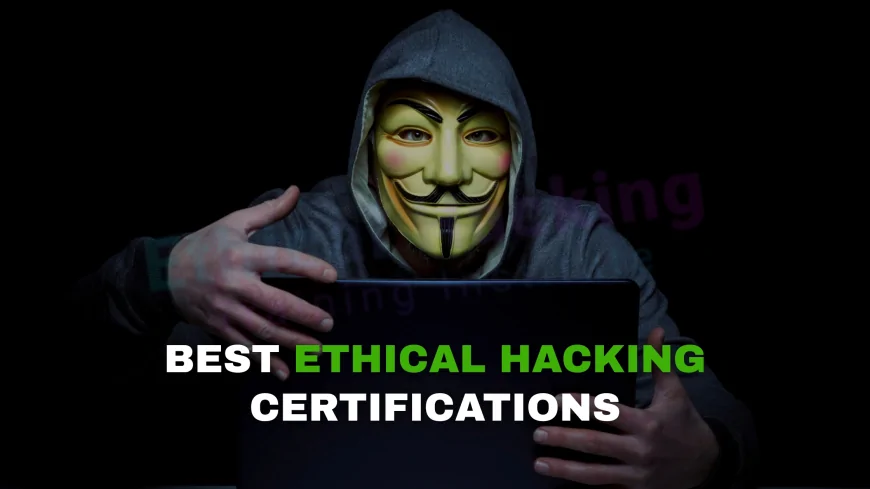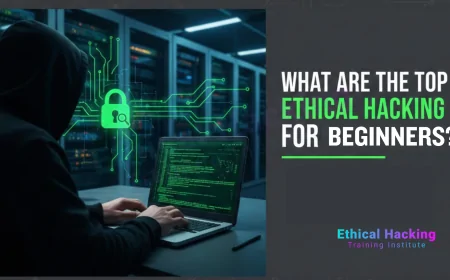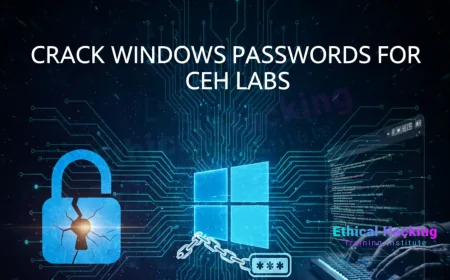The Best Ethical Hacking Certifications for Aspiring Cybersecurity Experts | Start Your Cybersecurity Journey: Best Ethical Hacking Certifications for 2025
Explore top ethical hacking certifications like CEH, OSCP, CISSP, and more to kickstart your cybersecurity career in 2025 with global recognition.

Table of Contents
- Introduction
- Why Ethical Hacking Certifications Matter in 2025
- Top Ethical Hacking Certifications
- Certification Comparison Overview
- How to Choose the Right Certification
- Preparation Tips
- Career Paths After Certification
- Future Trends in Hacking Accreditation
- FAQs
- Conclusion
Introduction
As digital threats escalate globally, **ethical hacking certifications** have become vital stepping stones for aspiring cybersecurity professionals. In 2025, certifications such as CEH, OSCP, CISSP, CompTIA PenTest+, and others stand out, offering both credibility and practical skill validation. These industry-recognized credentials open doors to high-impact roles, ranging from penetration tester to SOC analyst and cybersecurity consultant.
Why Ethical Hacking Certifications Matter in 2025
- Global demand: Over **3.5 million cybersecurity jobs remain unfilled** worldwide.
- Standardization: Certifications ensure competency across key domains like network scanning, malware analysis, web application security, and cloud/infrastructure protection.
- Employer trust: Certified professionals often earn higher starting salaries, e.g., CEH roles see $113k–203k per Glassdoor.
- Career progression: Advanced credentials like OSCP and CISSP enable deeper technical roles and leadership tracks.
Top Ethical Hacking Certifications
1. Certified Ethical Hacker (CEH) – EC-Council
TAs a leading certification, CEH verifies an individual’s ability to understand and defend against modern threats including malware, social engineering, and structured hacking attacks. The latest **CEH v13** includes AI-powered labs, integration with MITRE ATT&CK, and live CTF scenarios.
2. Offensive Security Certified Professional (OSCP)
A highly esteemed, hands‑on certification focusing on real-world penetration testing. At the end of the 24-hour practical test, candidates submit a detailed report that reflects real-world penetration testing standards. It’s notably more practical and technical than CEH.
3. Certified Information Systems Security Professional (CISSP)
Offered by (ISC)², CISSP is an expert-level certification covering eight domains of information security. Authorized by DoD and considered equivalent to a UK master’s degree.
4. CompTIA PenTest+
An entry-to-intermediate credential providing vendor-neutral validation of penetration-testing skills, recognized globally for being affordable and comprehensive.
5. GIAC Penetration Tester (GPEN)
Offered by SANS, GPEN emphasizes penetration testing methodologies and tool usage. Highly respected among security professionals.
6. Certified Penetration Testing Engineer (CPTE) – Mile2
A U.S. government–recognized certification with accreditation by the NSA and CNSS, focusing on practical penetration testing skills.
Certification Comparison Overview
| Certification | Level | Focus | Exam Type | Ideal For |
|---|---|---|---|---|
| CEH | Intermediate | Foundations & tools | MCQ + Optional Practical | Beginners to mid-level |
| OSCP | Advanced | Hands-on exploitation | 24‑hr Practical + Report | Pen‑test professionals |
| CISSP | Expert | Security architecture & management | 250 MCQs | Security leaders, managers |
| CompTIA PenTest+ | Entry–Intermediate | Pen‑testing basics | Performance + MCQ | Cost‑efficient skill builder |
| GPEN | Intermediate | Penetration methodologies | MCQ + Labs | SANS learners |
| CPTE | Intermediate | Government-grade pen‑testing | MCQ | NSA‑aligned analytics |
How to Choose the Right Certification
- Assess your level: Beginners → CEH/PenTest+; Experienced → OSCP; Leadership → CISSP.
- Define your goals: Hands‑on technical roles favor OSCP/GPEN; management roles favor CISSP.
- Budget & time: CEH and PenTest+ are shorter/cheaper than OSCP and CISSP.
- Employer demand: Use LinkedIn and Glassdoor salary data to compare industry requirements.
Preparation Tips
- Use official study guides and courseware.
- Set up home labs with **Kali Linux**, VirtualBox, and real tools.
- Practice on platforms like TryHackMe, Hack The Box, and CTFs.
- Take mock exams and practice exams.
- Join study groups and cybersecurity forums (e.g., Reddit, SANS).
Career Paths After Certification
- Penetration Tester / Ethical Hacker – recommended: OSCP or GPEN.
- SOC / Security Analyst – CEH with SIEM exposure.
- Security Consultant – CISSP and real-world experience.
- Bug Bounty Hunter – CEH + PenTest+ can help.
- Security Architect / Director – CISSP or higher.
Future Trends in Hacking Accreditation
As cyber threats evolve, expect certifications to:
- Integrate AI and threat emulation (e.g., CEH v13).
- Emphasize cloud, IoT, OT, and adversary simulation techniques.
- Require frequent renewals (e.g., OSCP+ introduced recertification in 2024).
FAQs
1. Which ethical hacking certification is best for beginners?
CEH and CompTIA PenTest+ are most beginner-friendly, covering fundamental skills and practical tools.
2. Is OSCP harder than CEH?
Yes, OSCP is more difficult—it’s a 24-hour hands-on challenge with report writing, testing practical skills.
3. What does CISSP cover?
Covers eight domains, including security governance, architecture, operations, and risk management. It's management-level :contentReference[oaicite:14]{index=14}.
4. Are CEH and OSCP recognized globally?
Yes, both are widely recognized across US, UK, APAC, and more.
5. Can I get a job after CEH?
Yes, CEH opens roles like pen tester, SOC analyst, and security consultant.
6. Does PenTest+ include practical labs?
Yes, it includes hands-on performance-based questions.
7. Is CISSP suited for penetration testing?
No, CISSP is broader security management, not focused on hacking.
8. What’s GPEN used for?
Specialized pentesting techniques and tool usage; ideal for SANS-trained professionals.
9. How often must I renew OSCP?
Traditional OSCP is lifetime; OSCP+ (introduced Nov 2024) requires renewal every 3 years.
10. Which certification offers the best salary?
CISSP roles average $156k/year; OSCP roles ~$96k; CEH roles range $113–203k.
11. Can I study for CEH online?
Yes, EC-Council offers online self-paced, live instructor‑led, and hybrid formats.
12. Does CPTE have practical assessments?
No, it relies on MCQs but comes with U.S. government accreditation.
13. Is prior experience required for CISSP?
Yes—5 years in 2 or more CISSP domains or 4 years with a degree.
14. Do ethical hacking certifications expire?
Yes—CEH/CISSP/GPEN require continuing credits or re-exams; PenTest+ requires renewal every 3 years.
15. How to prepare for OSCP?
Build labs at home, practice on hack platforms, and read “Penetration Testing: A Hands-On Intro”.
16. Do employers prefer CEH or OSCP?
Pen testers prefer OSCP; security operations and consulting roles may favor CEH.
17. Can CEH Practical make me a CEH Master?
Yes—passing both CEH and CEH Practical earns the “CEH Master.”
18. Is ethical hacking legal?
Yes—when authorized by owners. Unauthorized hacking is illegal.
19. How long does it take to prepare?
CEH/PenTest+: ~3–6 months with part-time study. OSCP/CISSP: ~6–12+ months.
20. Which is best for career advancement?
Start with CEH/PenTest+ for technical foundation, then OSCP for deeper skills; CISSP later for management roles.
Conclusion
Choosing the right ethical hacking certification depends on your experience, career goals, and learning style. For a structured start, **CEH or PenTest+** are excellent. For deep penetration testing mastery, **OSCP** leads. For career progression into strategic roles, **CISSP** is essential. Additional credentials like **GPEN** and **CPTE** further specialize you. Combine your certification with hands-on labs, continuous learning, and community participation to build a fulfilling cybersecurity career.
What's Your Reaction?
 Like
1
Like
1
 Dislike
0
Dislike
0
 Love
0
Love
0
 Funny
0
Funny
0
 Angry
1
Angry
1
 Sad
0
Sad
0
 Wow
0
Wow
0

















